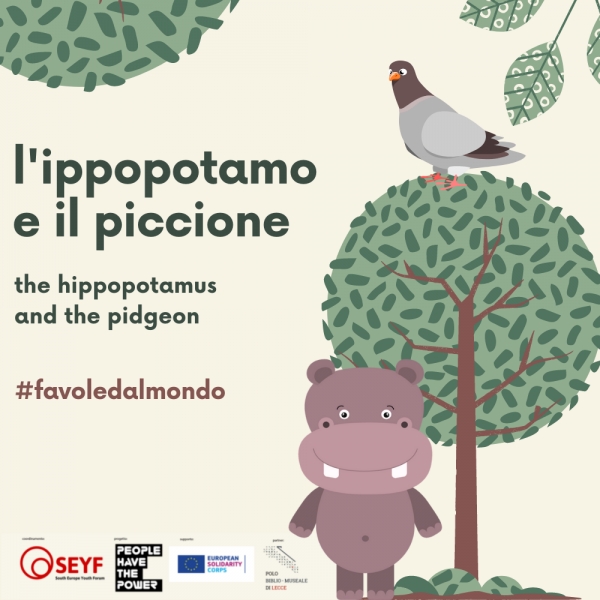![]()
Tanto tempo fa in una foresta vivevano un Ippopotamo e un Piccione.
Il Piccione aveva costruito il suo nido in cima ad un albero molto alto. Qualche giorno dopo, l'ippopotamo andò a vivere sotto lo stesso albero.
Entrambi gli animali trascorrevano le loro giornate in giro per la foresta alla ricerca di cibo, ma il Piccione rientrava al nido prima dell'Ippopotamo.
L'Ippopotamo tornava la sera tardi e, quando andava a dormire, faceva tremare tutto l'albero fino alla cima, poiché era molto grosso. Per questo, il Piccione si svegliava ogni notte disturbato dall'Ippopotamo.
Una notte il Piccione disse all'Ippopotamo: “Se fai così, il mio nido rischia di cadere. Per favore, fai attenzione!”.
L'Ippopotamo rispose: “Sono molto stanco, non mi va di parlarne adesso. Ne parliamo domani”.
L'indomani mattina, quando il Piccione scese dal nido per andare a parlare con l'Ippopotamo, non lo trovò perché era già uscito alla ricerca di cibo.
E così avvenne per tutti i giorni seguenti: ogni sera l'Ippopotamo rientrava tardi e metteva in pericolo il Piccione, che continuava a lamentarsi con lui. Tuttavia, l'Ippopotamo continuava a rimandare il confronto e a volte evitava proprio di rispondergli.
Un giorno arrivò un Cacciatore che vide che sotto l'albero viveva un Ippopotamo: decise di catturarlo, perciò sistemò una trappola e si nascose ad aspettare il ritorno dell'Ippopotamo.
Il Piccione dalla cima dell'albero vide tutta la scena, ma si rese conto di essere al sicuro e andò a dormire.
Quella notte, come al solito, l'Ippopotamo tornò a casa tardi e andò a dormire e, come sempre, solo dopo aver fatto tremare tutto l'albero e aver disturbato il Piccione.
Il cacciatore uscì dal suo nascondiglio e sparò all’Ippopotamo.
Il Piccione sentì il rumore dello sparo, scese a vedere cosa fosse successo e vide l'Ippopotamo in fin di vita.
Il Piccione si avvicinò al suo orecchio e gli disse: “In questi giorni, quando tornavi tardi, ti chiedevo di parlare e non lo hai mai fatto perché dicevi di essere stanco. Se mi avessi risposto, non ti sarebbe accaduto questo, perché ti avrei avvisato”.
Come possiamo comprendere dalla storia, è sempre importante comunicare e ascoltare gli altri.
----
Questa favola dal Mondo è stata scelta ed elaborata da Diallo, volontario originario della Guinea e residente in Italia, dopo una ricerca su risorse e biblioteche online e offline.
Favole dal mondo è una iniziativa nata nell’ambito dell’attività Inclusion Point realizzata all’interno del progetto “People have the Power”. L’obiettivo dell’iniziativa è favorire l’inclusione culturale attraverso la condivisione di conoscenze e storie dal mondo, per allargare lo sguardo e gli orizzonti, per scoprire l’altro e promuovere l’arricchimento e la crescita umana e sociale del territorio in un’ottica sostenibile e glocale, rispettosa delle diversità e delle minoranze.
“People have the Power” è un progetto promosso da SEYF nell’ambito del programma European Solidarity Corps, con il supporto dell’Agenzia Nazionale per i Giovani e la partnership del Polo biblio-museale di Lecce.
![]()
THE HIPPOPOTAMUS AND THE PIGEON
A long time ago a Hippopotamus and a Pigeon lived in a forest.
The Pigeon had built its nest on top of a very tall tree. A few days later, the Hippo went to live under the same tree.
Both animals spent their days wandering around the forest in search of food, but the Pigeon always returned to the nest before the Hippo.
The Hippopotamus came back late in the evening and, when he went to sleep, he made the whole tree shake up to the top, because it was very big. For this reason, every night the Pigeon woke up disturbed by the Hippopotamus.
One night the Pigeon said to the Hippo: “If you keep doing this, my nest risk falling down from the tree. Please be careful!”.
The Hippo replied: “I'm very tired, I don't want to talk about it now. We will talk about it tomorrow”.
The next morning, when the Pigeon came down from the nest to go talk to the Hippo, he did not find him because he had already gone out in search of food.
And so it happened for all the following days: every evening the Hippopotamus returned late and endangered the Pigeon, who continued to complain to him. However, the Hippo kept putting off the confrontation and sometimes just avoided answering him.
One day a Hunter arrived who saw that a Hippopotamus lived under the tree: he decided to capture it, so he fixed a trap and hid himself waiting for the Hippo's return.
The Pigeon, from the top of the tree, saw the whole scene, but he realized he was safe and he went to sleep.
That night, as usual, the Hippo came home late and went to sleep and, as always, only after shaking the whole tree and disturbing the Pigeon.
The hunter came out of his hiding place and shot the Hippo.
The Pigeon heard the sound of the shot, went down to see what had happened and saw the Hippopotamus close to the death.
The Pigeon approached the Hippo's ear and said to him: “These days, when you came back late, I asked you to talk with you, but you never did it, because you said you were tired. If you had answered me, this would not have happened to you, because I would have warned you ”.
As we can understand from the story, it is always important to communicate and listen to others.
----
This fairy tale from the world was chosen and elaborated by Diallo, a volunteer originally from Guinea and resident in Italy, after a research on online and offline libraries and resources. Fairy Tales from the World is an initiative undertaken within the ‘Inclusion Point’ activity created in the "People have the Power" project.
The aim of the initiative is to foster cultural inclusion through the sharing of knowledge and stories from the world, in order to broaden the gaze and horizons, to discover the others and the promote the human and social growth of the territory in a 'sustainable and “glocal” perspective, respectful of diversity and minorities.
"People have the Power" is a project promoted by SEYF within the European Solidarity Corps program, with the support of the National Youth Agency and with the partnership of the Polo biblio-museale di Lecce.

